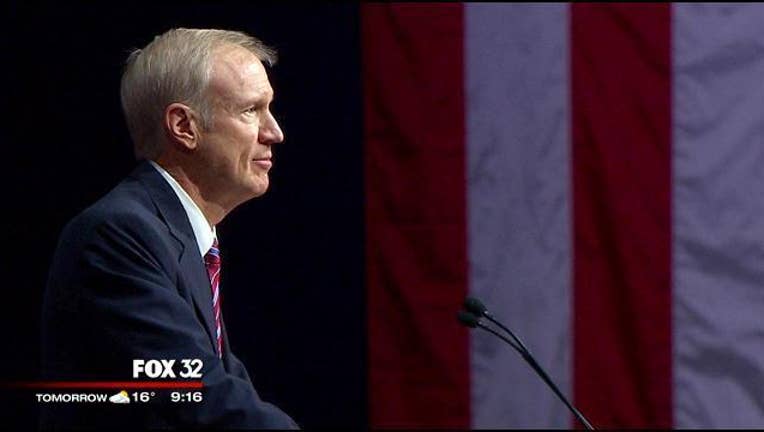Amid budget mess, Rauner to seek more efficient government

SPRINGFIELD, Ill. (AP) - Gov. Bruce Rauner will call for new ways to make government more efficient as he delivers his second State of the State address Wednesday during one of the most tumultuous times for Illinois in recent history.
The Republican will seek to reduce "wasteful bureaucracy" in education, hold schools "truly accountable for results" and change the way the state buys goods and services, according to excerpts of the speech his office released late Tuesday. He'll also repeat calls for fixing Illinois' pension crisis and reducing the number of inmates in state prisons.
Rauner is outlining his 2016 plans amid a seven-month budget standoff with majority Democrats that has caused cuts to social services and higher education and plunged Illinois further into debt. Neither side is budging. Democrats say a tax increase is necessary to close a multibillion budget hole. Rauner maintains he won't support a tax increase without reforms he wants, including imposing term limits, limiting the power of unions and making it easier for businesses to operate in Illinois.
Here's a look at some of Rauner's latest proposals, and how the stalemate is affecting people in Illinois:
___
WHAT TO EXPECT IN SPEECH
Rauner will repeat many of the agenda items that have led to the deep divide at the statehouse when he addresses lawmakers at noon Wednesday. But he'll also pitch some newer ideas.
Among them are changes to the way Illinois buys goods and services. Lawmakers passed new procurement laws after former Gov. Rod Blagojevich, now imprisoned for corruption, left office. The goal was to make the process more transparent and restore faith in government. But Rauner says the laws also increased the amount of time it can take state agencies to buy items from two to three months to nine to 12 months.
Rauner says his proposed changes, which he didn't detail, could save Illinois $500 million annually.
The governor also will pitch changes to how the state delivers health care and human services, an area where Illinois spends billions each year but that Rauner will describe as "a broken patchwork of reactive, expensive, and ineffective interventions."
___
SOCIAL SAFETY NET PROGRAMS
Around the state, hundreds of human services agencies have made cuts and the future looks dire, according to a survey released Tuesday by the United Way of Illinois. It found that 85 percent of 444 agencies it queried this month have reduced the number of clients they serve since July, when the state's annual budget should've taken effect. The agencies provide an array of services, including emergency housing, aid for disabled children, home-delivered meals for seniors and employment training.
Chicago advocates pushed lawmakers ahead of Wednesday's address to consider long-term impacts. Erie Neighborhood House, which helps low-income families, laid off staff and cut technology and afterschool programs affecting at least 250 people.
"In this time in our city, in our state, those children, those youth and those adults need to have a place to be able to go," said executive director Celena Roldan.
___
SUPPORT FOR COLLEGES
Colleges, universities and their students have also been harmed. This week, Eastern Illinois University was the latest to feel the repercussions from the budget deadlock, with school President David Glassman telling employees in a letter there will be delays in maintenance and repairs, cuts to all non-instructional equipment purchases, and no reimbursement for travel. Glassman said in the letter that layoffs and furloughs are possible.
At Chicago State University, a predominantly black school on Chicago's South Side, officials announced last week that by March they won't have money to pay employees.
Meanwhile, low-income students who rely on the Illinois grants to pay tuition won't be getting that help this spring.
___
MORE DEBT
Even without a budget, the state has continued to operate - and spend - because of court orders to keep some essential services running. That's increasing the state's debt because the spending is based on revenue levels from last year, before Illinois' income tax rate dropped.
A recent report from the Governor's Office of Management and Budget says if the current spending levels continue without new taxes or the Legislature cutting spending the deficit for the fiscal year ending in June will be $4.6 billion.

